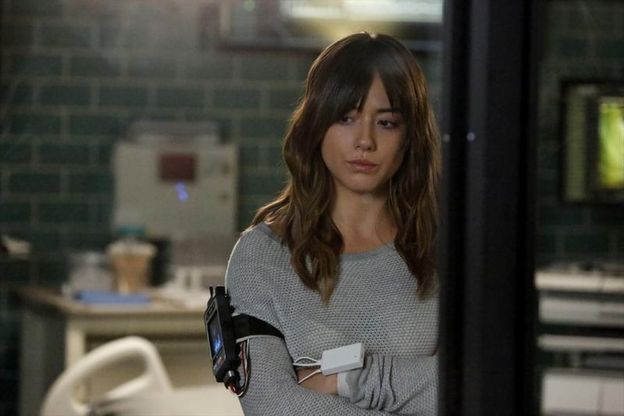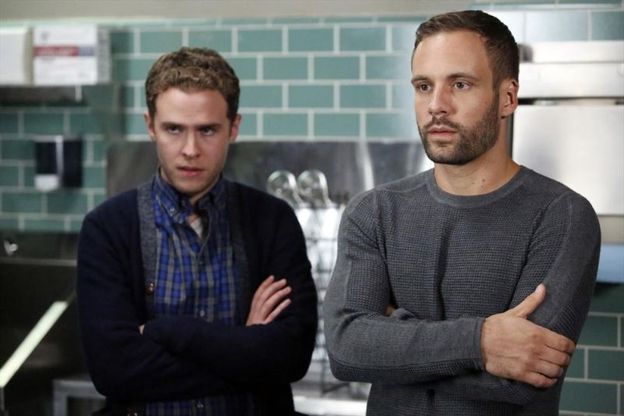What is to become of Marvel's Agents of S.H.I.E.L.D.? Both on screen and off, the TV drama stands in a precarious position in the Marvel Cinematic Universe. After a shaky first season, the show kicked back to life last fall with a more confident cast of characters and bigger superspy ideas. But when it came time for a winter break, sister show Agent Carter captured the hearts of fans and critics in a more immediate way without jolting the mid-level ratings picture of Marvel's ABC offerings.
So as S.H.I.E.L.D. returned Tuesday night, the same familiar question of whether the show can survive hung in the air. But luckily for viewers, the characters grappled with a similar existential drama of their own to mostly strong results.
Though the return installment "Aftershocks" explores the way in which the team is dealing with the literally earth-shaking events of the winter finale, the heart of the show stands well established by now. S.H.I.E.L.D. Director Coulson and his protégé Skye represent the yin and yang of characters in the MCU. He wants to establish a familial, humanistic response to the madness of super threats like Hydra. She submits herself to a transformation that brings her deep into the ranks of the world's growing powered population. But neither character engages these journeys in expected ways.
On the Coulson side of the coin, the response to the high death toll the team's battle with Hydra rung up is simple: get angry and strike back. There is no room for doubt or blame in the Director of S.H.I.E.L.D.'s world – only results. With team favorite wingman Agent Trip having been a casualty of the war for the mysterious underground city, Coulson plans to cut off not one head of Hydra in retaliation but as many of them as possible at once.
The way he undergoes this plan is presented in a twisting series of action scenes and clever dialogue (it is a spy show after all), but Coulson's move to set the Hydra elite after each other by dangling lieutenant Bakshi in front of them is a pretty straightforward move. Aside from a few moments of action on that front which present a TV budget version of the shoot-em-up action of Captain America: The Winter Soldier, the real fireworks of the storyline are from how Coulson's coworkers respond to his passionate planning.
The normally gentle Agent Simmons lets her guilt over Trip's death drive her towards a scorched-earth policy for the Kree science that led them down this path. Meanwhile, Agent Hunter becomes a willing team player while team mechanic Mack brazenly casts doubt on Coulson's leadership. When it's revealed late in the game that both Mack and Bobbi "Mockingbird" Morse are working on the sly to free some kind of Nick Fury tech from Coulson's hands, the move feels earned and honestly intriguing. The pair aren't quite traitors to the cause, but it's doubtless that their ultimately loyalties lie elsewhere than the current S.H.I.E.L.D. configuration.
Over in Skye's world, the more fantastical aspects of the show lead to more angst than Stan Lee could shake a stick at. Trapped in quarantine after interacting with the mysterious mists, S.H.I.E.L.D.'s resident hacker beats herself up over what she's convinced was her inescapable role in Trip's death (that's been going around) as her own newfound earthquake-making powers struggle to break loose again. That sense of guilt amidst a barely buried physical limitation is mirrored in the mindset of Fitz – still working to regain both his genius and his motor function as he investigates Skye's change.It's that shared status as the team's "broken" members that forces Fitz to hide evidence of Skye's genetic change from the rest of the team even as he gives her the prescient status of having become "inhuman."
Speaking of, the long path to the hidden race of superpowered weirdos tooks its greatest steps forward this week, and the growing focus on the characters who will be the defacto mutants of the MCU provide the hour with its most entertaining moments. From the cold open flashback that saw Skye's mother serve as a sort of entrance counselor past people who had undergone "Terrigenesis" through bad guy Raina's mad scramble to come to terms with her new form as a quill-spewing inhuman, the episode's themes of traumatic alienation found their most visually arresting expression here. And when you layer in the "guess whether the teleporting eye-less man Harold will be confirmed as a Marvel Comics c-lister" game, the future of the storyline has endless fandom fun potential.
So where do the Agents of S.H.I.E.L.D. go from here? Into a shortened network TV run or another season of strong development? This week's episode couldn't possibly provide answers on those kinds of questions, but even as it mostly serves as setup for the back half of season 2, the gains it achieves in deepening this world and its characters earns it our attention for as long as it runs.



